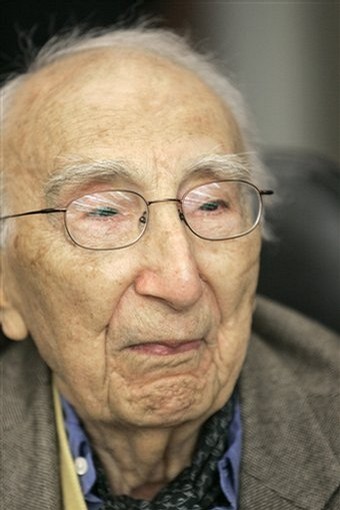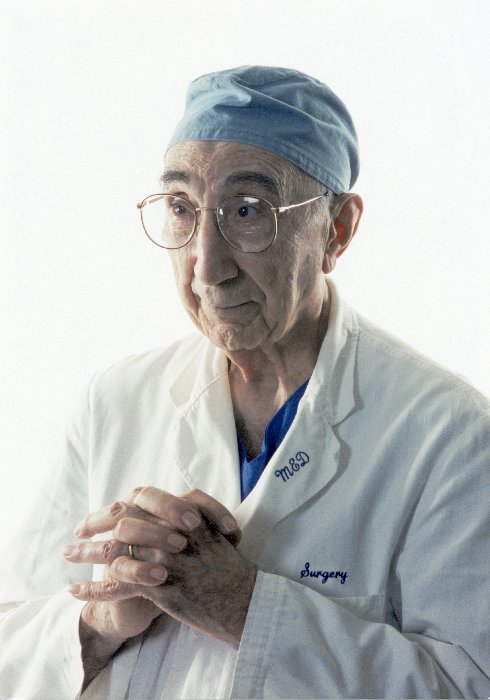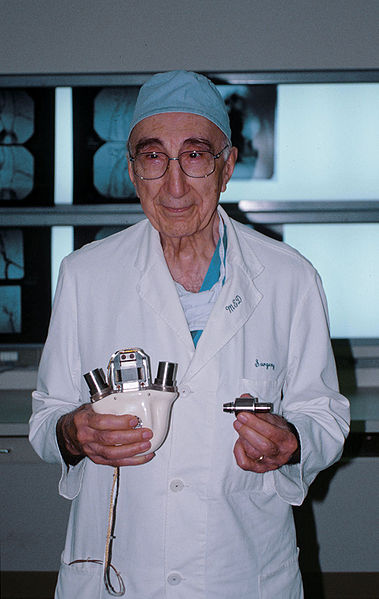<Back to Index>
- Cardiac Surgeon Michael Elias DeBakey, 1908
- Writer Aleksandr Ivanovich Krupin, 1870
- Explorer of Australia John McDouall Stuart, 1815
PAGE SPONSOR



Michael Elias DeBakey (September 7, 1908 – July 11, 2008) was a world renowned American cardiac surgeon, innovator, scientist, medical educator, and international medical statesman. DeBakey was the chancellor emeritus of Baylor College of Medicine in Houston, Texas, and director of The Methodist DeBakey Heart & Vascular Center and senior attending surgeon of The Methodist Hospital in Houston.
Michael Elias DeBakey was born as Michel Dabaghi in Lake Charles, Louisiana, to Lebanese immigrants Shaker and Raheeja Dabaghi (later Anglicized to DeBakey).
DeBakey received his BS degree from Tulane University in New Orleans. In 1932, he received an M.D. degree from Tulane University School of Medicine. He remained in New Orleans to complete his internship and residency in surgery at Charity Hospital. DeBakey completed his surgical fellowships at the University of Strasbourg, France, under Professor René Leriche, and at the University of Heidelberg, Germany, under Professor Martin Kirschner. Returning to Tulane Medical School, he served on the surgical faculty from 1937 to 1948. From 1942 to 1946, he was on military leave as a member of the Surgical Consultants' Division in the Office of the Surgeon General of the Army, and in 1945 he became its Director and received the Legion of Merit. DeBakey helped develop the mobile army surgical hospital (MASH) units and later helped establish the Veteran's Administration Medical Center Research System. He joined the faculty of Baylor University College of Medicine (now known as the Baylor College of Medicine) in 1948, serving as Chairman of the Department of Surgery until 1993. DeBakey was president of the college from 1969 to 1979, served as Chancellor from 1979 to January 1996, he was then named Chancellor Emeritus. He was also Olga Keith Wiess and Distinguished Service Professor in the Michael E. DeBakey Department of Surgery at Baylor College of Medicine and Director of the DeBakey Heart Center for research and public education at Baylor College of Medicine and The Methodist Hospital.
DeBakey's ability to bring his professional knowledge to bear on public policy earned him a reputation as a medical statesman. He was a member of the medical advisory committee of the Hoover Commission and was chairman of the President's Commission on Heart Disease, Cancer and Stroke during the Johnson Administration. He worked in numerous capacities to improve national and international standards of health care. Among his numerous consultative appointments was a three year membership on the National Advisory Heart and Lung Council of the National Institutes of Health.
DeBakey served in the U.S. Army during World War II and
helped to revolutionize wartime medicine by supporting the stationing
of doctors closer to the front lines. This concept greatly improved the
survival rate of wounded soldiers and resulted in the development of Mobile Army Surgical Hospital (MASH) units during the Korean War. At age 23, while still in medical school at Tulane University, DeBakey invented the roller pump, the significance of which was not realized until 20 years later when it became an essential component of the heart - lung machine. The pump provided a continuous flow of blood during operations. This, in turn, made open - heart surgery possible. With his mentor, Alton Ochsner, he postulated in 1939 a strong link between smoking and carcinoma of the lung. DeBakey was one of the first to perform coronary artery bypass surgery, and in 1953 he performed the first successful carotid endarterectomy. A pioneer in the development of an artificial heart, DeBakey was the first to use an external heart pump successfully in a patient – a left ventricular bypass pump. DeBakey pioneered the use of Dacron grafts to replace or repair blood vessels. In 1958, to counteract narrowing of an artery caused by an endarterectomy, DeBakey performed the first successful patch - graft angioplasty.
This procedure involved patching the slit in the artery from an
endarterectomy with a Dacron or vein graft. The patch widened the artery
so that when it closed, the channel of the artery returned to normal
size. The DeBakey artificial graft is now used around the world to
replace or repair blood vessels. In
the 1960s, DeBakey and his team of surgeons were among the first to
record surgeries on film. A camera operator would lie prone atop a
surgical film stand made to DeBakey's specifications and record a
surgeon's eye view of the operating area. The camera and lights were
positioned within three to four feet of the operative field, yet did not
interfere with the surgical team. DeBakey worked together with Denton Cooley while they both practiced at Baylor College of Medicine. According to the April 18, 1969 issue of Life magazine, they had a disagreement associated with Cooley's apparently unauthorized implantation of the first artificial heart in
a human. DeBakey had set the surgery for Friday, April 4, 1969, and
because of a schedule conflict relating to a speech in Corpus Christi,
Texas, rescheduled it for the following Monday. Cooley then rescheduled
back to the original date and performed the surgery while DeBakey was
out of town. The press covered the surgery and Cooley gained much
publicity. DeBakey was angry at Cooley for his actions. Cooley then
left Methodist Hospital and signed on with St. Luke's Episcopal Hospital across the street. Their disagreement turned into a bitter feud that lasted for decades; the two men reconciled in 2007, but DeBakey made it public by inviting Cooley to his Congressional Gold Medal ceremony. On
May 2, 2008, DeBakey inducted Cooley into the Michael E. DeBakey
International Surgical Society, presenting him with a leather - bound
copy of the first medical article the two co-authored and a lifetime
achievement award. To the amazement of his colleagues and patients, DeBakey
continued to practice medicine into an age well after most others have
retired. DeBakey practiced medicine until the day he died, and nearly
reached 100 years of age in 2008. His contributions to the field of
medicine spanned the better part of 75 years. DeBakey operated on more
than 50,000 patients, including several heads of state. DeBakey
and a team of American cardiothoracic surgeons, including George Noon,
supervised quintuple bypass surgery performed by Russian surgeons on Russian President Boris Yeltsin in 1996. In 1969, the Baylor College of Medicine separated from Baylor University under his direction. The DeBakey High School for Health Professions, the Methodist DeBakey Heart & Vascular Center and the Michael E. DeBakey Veterans Affairs Medical Center in Houston at the Texas Medical Center in Houston are
named after him. He had a role in establishing the Michael E. DeBakey
Heart Institute at the Hays Medical Center in Kansas. Several atraumatic
vascular surgical clamps and forceps that he introduced also bear his
name. DeBakey founded the Michael E. DeBakey Institute at Texas A&M College of Veterinary Medicine & Biomedical Sciences as a collaboration between Texas A&M, the Baylor College of Medicine and the UT Health Science Center at Houston to further cardiovascular research. DeBakey received the Presidential Medal of Freedom in 1969 even though his name was later found on Nixon's Enemies List. In 1987, President Ronald Reagan awarded him the National Medal of Science. He
was a Health Care Hall of Famer, a Lasker Luminary, and a recipient of
The United Nations Lifetime Achievement Award and the Presidential Medal
of Freedom with Distinction. He was given the Lifetime Achievement
Award of the Foundation for Biomedical Research and in 2000 was cited as
a "Living Legend" by the Library of Congress. On April 23, 2008, he
received the Congressional Gold Medal from President George W. Bush, Speaker of the House Nancy Pelosi, and Senate Majority Leader Harry Reid. On December 31, 2005, at age 97, DeBakey suffered an aortic dissection. Years prior, DeBakey had pioneered the surgical treatment of this condition, creating what is now known as the DeBakey Procedure. He was hospitalized at The Methodist Hospital in Houston, Texas. DeBakey
initially resisted the surgical option, but as his health deteriorated
and DeBakey became unresponsive, the surgical team opted to proceed with
surgical intervention. In a controversial decision, Houston Methodist
Hospital Ethics Committee
approved the operation; on February 9–10, he became the oldest patient
ever to undergo the surgery for which he was responsible. The operation
lasted seven hours. After a complicated post - operative course that
required eight months in the hospital at a cost of over one million
dollars, DeBakey was released in September 2006 and returned to good
health. Although
DeBakey had previously refused surgery, he later stated that he was
grateful that his surgical team performed the operation. He
was present at Baylor College of Medicine for the groundbreaking of the
new Michael E. DeBakey Library and Museum on October 18, 2006.
On July 11, 2008, DeBakey died at The Methodist Hospital in Houston; the cause of death remained unspecified. DeBakey
was preceded in death by his first wife, Diana Cooper DeBakey who died
of a heart attack in 1972 and by his sons, Houston lawyer Ernest O.
DeBakey, who died in 2004, and Barry E. DeBakey, who died in 2007. His
brother Ernest, an oncologist in Mobile, Alabama, died in 2006. In addition to his wife, Katrin, and their daughter,
Olga, DeBakey was survived by sons Michael and Denis, as well as sisters
Lois and Selma DeBakey, who are both medical editors and linguists at
Baylor. A memorial service was held at the Co-Cathedral of the Sacred Heart on July 16, 2008 after lying in repose in Houston's City Hall, the first ever to do so. He was granted ground burial in Arlington National Cemetery by the Secretary of the Army. On
January 21, 2009, DeBakey became the first posthumous recipient of The
Denton A. Cooley Leadership Award, an award he agreed to receive before
his death.
DeBakey founded and chaired the Foundation for Biomedical Research (FBR),
whose goal is to promote public understanding and support for animal
research. DeBakey made wide use of animals in his research. He antagonized animal rights and animal welfare advocates who oppose the use of animals in the development of medical treatment
for humans when he claimed that the “future of biomedical research; and
ultimately human health” would be compromised if shelters stopped
turning over surplus animals for medical research. Responding
to the need for animal research, DeBakey stated that "These scientists,
veterinarians, physicians, surgeons and others who do research in
animal labs are as much concerned about the care of the animals as
anyone can be. Their respect for the dignity of life and compassion for
the sick and disabled, in fact, is what motivated them to search for
ways of relieving the pain and suffering caused by diseases."